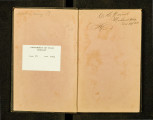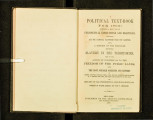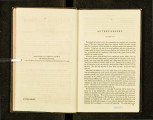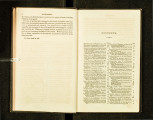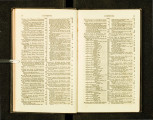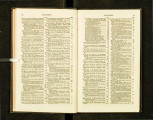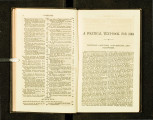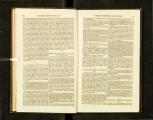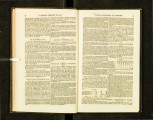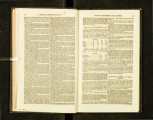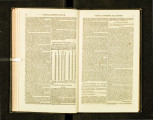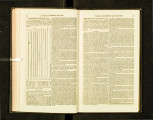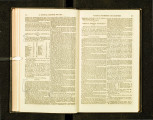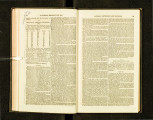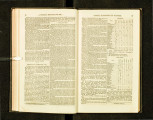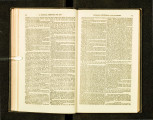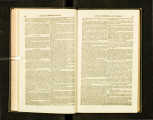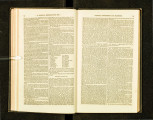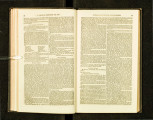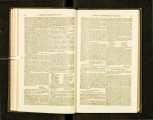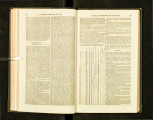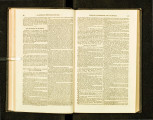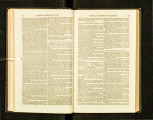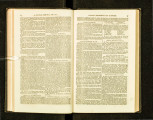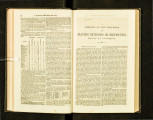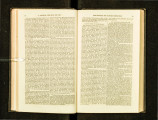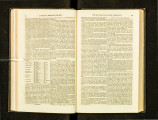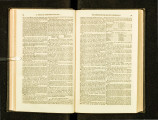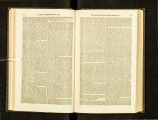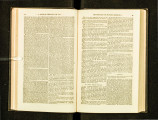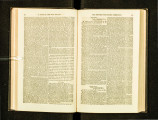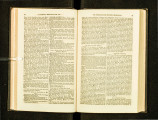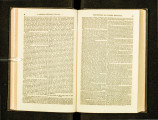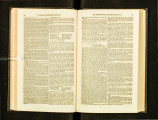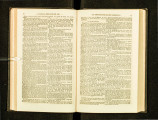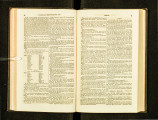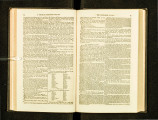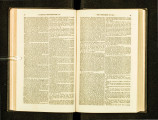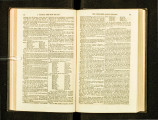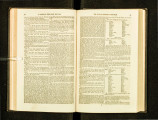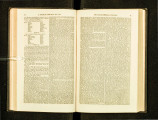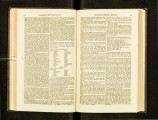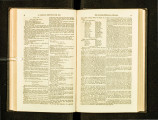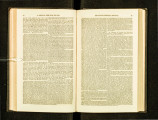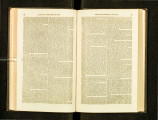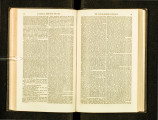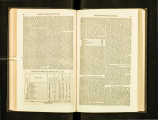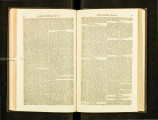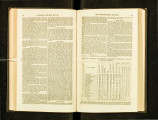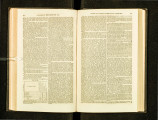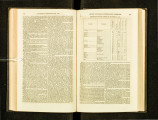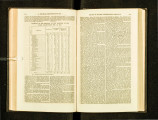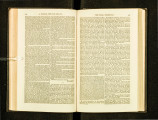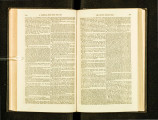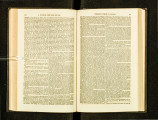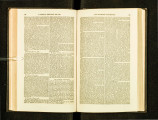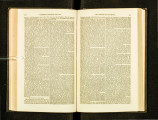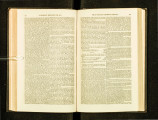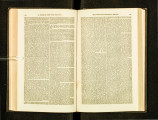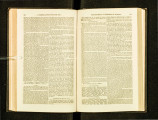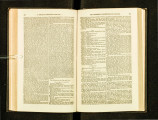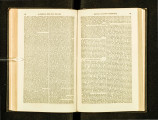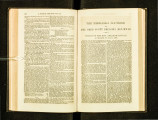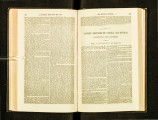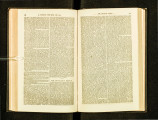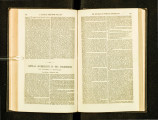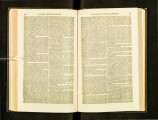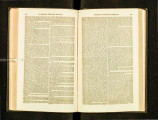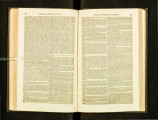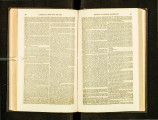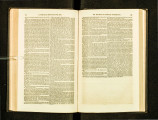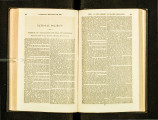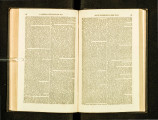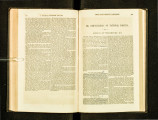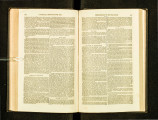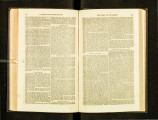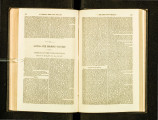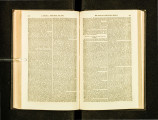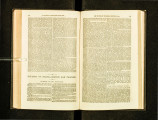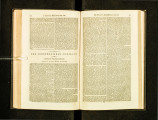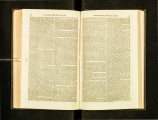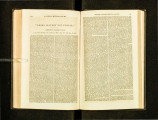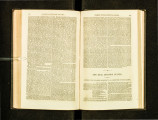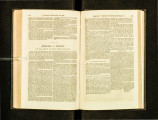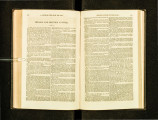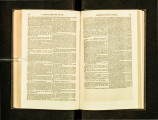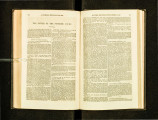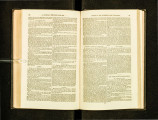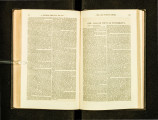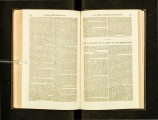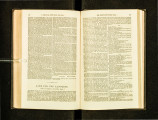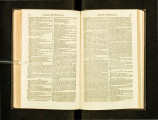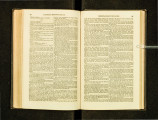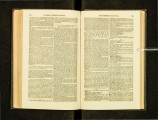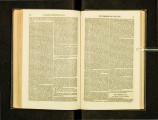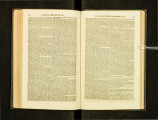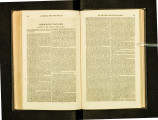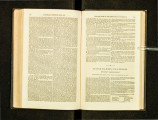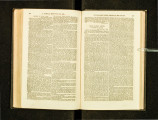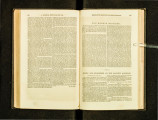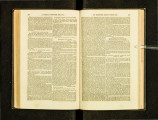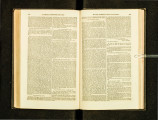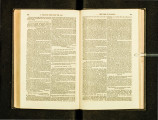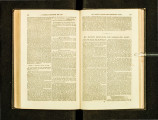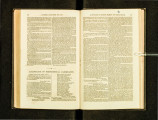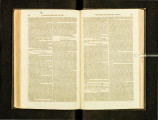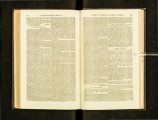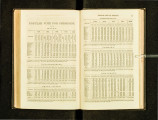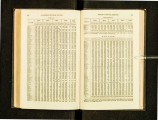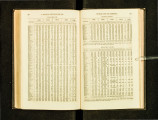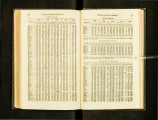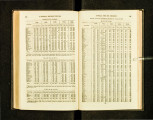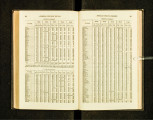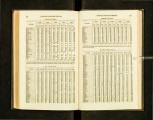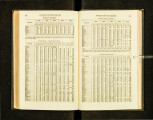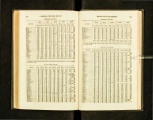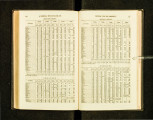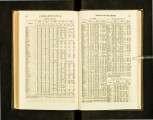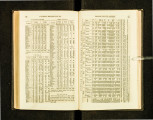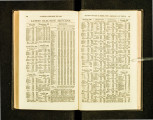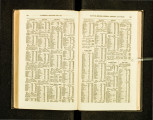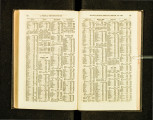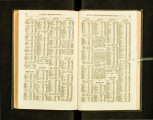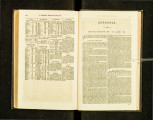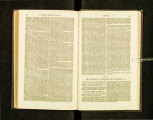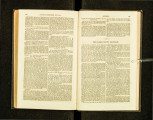| OCR Text |
Show ' ) A POLITICAL TEXT-DOOK FOR 1860. 19, (all \Vhig~ but Calhoun, of S. C., and Yul~e Mr. IIouston, of Dc~awn.re, voting in the majority of .Florida); Nays, 26, (24 Dem., with Corwm as bcf?re: othcrwtse,, members from the ,.,Free of Ohio and Johnson of Louisiana.) States !n the nffirm.attvo; those from the ;:,lave Mr. w'cstcott, of Fla., immediately moved. that l States m the n~ga~tvc. ] the bill do lie on the table, which pre~atled: Au,q. 3.-Thts btll reached. th~ Scnat.e, when Yeas, 26; Nays, 18 (a mixed vote, cvtdcntly Mr. Badger, of N: C., moved Its mdefimte post. govcrne<.l by various motives); b~t the nega- ponement: negatived, ~7 to 1, ~Y~t~?e) .. It was tives were all Democrats, but Corwm and John- then sent to the Conumttee on fctu t~n cs . . son aforesaid. This being the l.ast. day of the The . Senate .had ha<.l under con ~deratto~, SC~'Pion it was evident that the b tll, 1f opposed, from t1mc to tune tlnough the Sos ·ton, a btll n "iL w~s certain to L>e could not get through, of its own, repor·tcd by Mr·. Douglas, which was and it wal', doubtless, in behalf of other press- finally referred ton sel?ct Committee-M.r. Clay. in(J' business that many Senators voted to lay ton, of Deln.ware, Chatrmnn-and IJy satd cotn. th~s aside. It was, of course, dead for theses- mittee reported some days before the reception sion. of the llouse bill. It was then dropped. Dec. G, 184.7.-The XXXth Congress asscm- A 'ug. 6.-Mr. Douglas reported the ITouse ble<.l; Robert C. Winthrop (Whig) of Mass. was bill, with amendments, which we re printed. cho 'en Speakct· of the llouse. President Polk, Aug. 10.- After flome day ' debate, the in hi AtlllUal Me age, regretted that Oregon Scuatc proceeded to vote. Mr. Foote, of Miss., had not alrca.(ly been organized, and :ngcd the moved that the l>ill do lie on the table. De· necessity of action on the suuject. featctl: Yeas, 15 (Southern); Nays, 36. Feb. !J.--\lt·. Caleb B. S111ith, of Indiana, rc- On the question of agrcciug to this amcnJ ported to the IIou ·c a bill to establish the terri- mont: tol'in.l g t•\'Cl'lll1lent of Oregon; whieh, by n vote Inasmuch as the sai<l Territory is north of th irty-six of two-thirus, was made a specilll OI'UCr for deg. thirty min., mmally known as the (line of the] Mis Mat·ch l-l.th. It was po tponcd, however, to souri Compromise. the ~ th; when it wa.s taken up and discussed, It was rejected: Y cas, 2 (Bright and Do!J as on ouc or two s ubsequent days. J,fay 29th, glas); Nays, 62. it was again made a special order next after the Mr. Douglas moved to amend the bill, by iu· Appro priation bill._ 'l'he President that day sorting after the word u enacted:" sci1L tl • pecial mess:tge, urging action on this That the line or thirty-six degree and thirty subiect. July 25th, it was taken up in earnest; minutes of north latitude, kuown :t.s Utt: Missouri Com· J promise line, as defined in the eighth section of an ac& Mr. \Ve utworLh, of lllinoi , moving that debate entitled," An Act to authoriz. the people of the Missouri on it in Committee cease at two o'clock thia Territory to form a Constitutional and State Govern· day. ment., and f<Jr the admission of such State into tht: Union- G S II f 1 d on an equal footing with the origin11.l States, and to pro· Mr. co. · ouston, 0 A.~.:.., en cavored to hibit ShLvery in certain Territories, approvetl 1\larch 6th, put thi::s motion on the table. Defeated: Yeas 1 20," be, and the same it~ ltereby, decl:u·ed to ext.end to 85; Nays 0, (nearly, but not fully, a sectional the Pacific Ocean; and the said eighth sect.ion, together · ~1 G \V J f m with the compromise therein ciTecLe<l, is l•ere))y revived, division). 1 ' r. eo. · ones, 0 1cun., moved and declared to be in full force and binding, for tlte a reconsideration, which was canic<.l: Yeas, future organiz;Ltion of the Territories of the United 100; ~ay8, 8 ; und the resolution laid on the States in the ~ame sense, and with the same understand· tulJir: y ca . 1 f)6 ; , ays, 90. ing wiLh which it was originally adopted; and- The uill eomi uue <.l to be discussed, and Which was carried: Y cas, 38; Nays, 21; as fol finally (Aug. l) was got out of Committee; low : when jf t'. C. B. Smith lllOved the Previous Yeas-Fot· recogni zing the Missouri line as Que tion thereon, wlri t:h was Ol'det·cd. rightfully e xteudi11g to the Pacific: Aug. ~. --The IIou~l! carne to ~ vote on an ~lessrs. At chison, Hannegan, amcnlilllcnt lllttde in Cornmittec, whet·eby the Hudgcr, Houston, r Bell, llunt ~:r, tOIIowing provi ion of tlte origiual bill was Denton, J ohn8on of Mtl., stricken out : Berrien, J ohnson of La., That the inh;tbitants of sai1l Territ ory sltn.ll be entiDoriH. n<l, J ohnson of Ga., tl~<l to enjoy all lLIHI singular, the r il(hts, privileges, and ad vantages granted and secured tu Lht: people of the 'I'errltory of the United SL!tte!$ northwc~t of the rivrr· Ohio, l.iy the articles of compact contained in the ordinll. ncc fur !Itt: govcrnmtut of said Territory, passed the 18th da.v of Ju ly, seventeen hundred and eighty-seven· und t~ltH.Il be :-uhj.:ct to all the conditions, and rest ric~ Uons, aud prohibitions in said articles of compact im .. pubcll upou Lla: people of said territory, and- The If ouse refu.;ed to agree to this amendment: Yeas, 88; Nays, 114:. The Mc 111 uers from the Free States who voted with the South to stl'ike out, were- N~~:w YoaK.-Ausburn Dirdsall-1. Ou10.-Williarn 1\:ennon, jun., John K. Miller-2. l&.LIN(IIS.-Orlando n. l<'tcklin, John A. McClernand William A lticltardson-3. ' lNDU.N.\.- John L. Roll inson, William W. Wick-2. Mr. John W. llouston o~ Delaware voted in the maJority, 71.T he biT. was then passed: Y cas) 128 • Nays t ) (This vote was almost completely sectional. Bright, King, .Uut ler, Lewis, Calhoun, Mangum, Cameron, 1\[ason, Davis of Miss., Mctcalf, Dicki nson, Pearce, Douglas, 8ebaslian, lJowns, ~pru:tnce, Ji'itzger~Jld, Sturgeon, Foote l•f Miijs., 'l'urney, U nderwood-33. Nays-.A.gainst tccognizing said line: Messrs. Allen, Do•lge, Atherton , Felch, llald win, Greene, llradi.JUry, Hale, R re~~e , Hatnlin, Clarke, !\filler, Corwin, Niles, D;wis of Mass., Phelp!!, Dayton, Upham, Dtx, Walker, Wt:bster-21. The bill was then engrossed for a third reAding : Yeas, 33 ; N aya, 22 ; (nearly the same &S THE CO.llPROliiSE OF 18.30. oeforc-W t-~>tcott of Florida addc<.l to the Nuys-rwd thus pa ' ::l<'d ). A ug. ll.-'I'hc bill, thu amended, having been retu r ned to the Jlou1<e, the arnen<.lm 'IlL of Mr. DouglaR, ju:t r ecited, was rcjecte<.l: Re,qolcerf, 1'hat, as the people in Territories h1n·e the Mme Inherent rights of self·government as the people in the _'tates, ir in the exercise of such iniH;l'"nt rights the people 111 tire newly-acquired 'J'erritoric'l, by toe Annexation of 'J'exa an1l the acqubition of Val•fomia aud New·Mel:lco, south or the parallel of 13{) degrees and :.JO minutes of ~ ort h latitude, extending to the l'acilic Ocen.o, shall estab· lr 'h N ewo . Ia very in tht: formation of their state govern- Yeas, 8:2; i\ ay:::, l ~1. Y cas from }'rce • 'tat 'S : Nr.w Yon1c-A u~hut·n Dird~all-1. Pli:SNSYL\'.\N l.l.--Uharlc:; Urown, Charles J. I ngersoll-2. Total-3. ments, lL shall be deemetl no ohjcction to their a dmission ns a ::>tate or States iuto the Union iu accordance with the Constitution of tlte United StaLe;. Jum . 21.-Gen. Taylot·, in answer to a resolution of iuquiry, sent a lllCHRa ~"e to the House stating that he had urged ~1e fo rmation of State Govemmcnts in ()alifomia and NowMexico. Othcnvi.r, from lave States, all Yeas: from free State~. ntl !Says. Aug. 1 :!.-Titc Senate, after votinO' down various proposition!:! to lay on the table, etc., finallv decided to 'recede from its amendments to the Oregon IJill, nud pnss it as it came from the llouse: Yen.r:;, 29; Nays, 25 (all from Slave Stutc ). Feb. 13, 1850.-Gen. Taylor communicated to Congress the Cousti t ution (free) of the State of Califomia. Jru·'· 29, 1850.-Mr. llcnry Clay, of Kentucky, subrmttcd to the Senate the followin(J' pro~ po. itions, with others, which were IIHtllc a ~pccial order an<.l printe<.l: 'o the bill became a ln.w, and Ore (J'on a Tcrl'itory, under the original J effcr:son o~ Dane I'ro,. i o again ·t 'l:n-ery. Tlf I<: CO:\£PRO:\f!Sl•: OF 1850. The .XXX[st Congress commenced i ts first Se Ilion at Wushing~on, Dec. 3, 181fJ; l>ut the llou·e was unal>lc to organize-no· p e r, on r e ceiving a mnjodty of a.ll the votes fo r Speaker :-until the :l:!nd, when, the Plurality rule ltavtng been ntlo ptell by n. vote of 113 to l OG, Mr·. flowcll Cobb, of Ga., wa elected, havin(J' 102 vote to l OU l'or Uohert C. Winthrop of Krass., and 20 rntt c l'ing. It Wtl. thereupon resolved -Yens, H U; Nays, 35-" That Uo\,·ell Cobb be declared duly cl1'etcd Speaker;" and on the 24th rresidcnt Z:tchary 'l'aylor tran.smitted toboth IIousC' hi. first Annu11.l Mes :\0'~ in the cout·..;e of which he sttys: 0 ' No civil f{':~e rn.men t hn.ving been provided by Congress for Caltfo rn 1a, lhc J'POple of that 'l'crritory impelled by the n•·ce~~it ie~ of their polit ical eondi1tion, recent!~ rn~t in Conventi1~n, for the purpose or forming a C~nstrlutt on and Stall: O<>vern ment; which, the laLI!~t a~vrces give me reason til suppose, has been accomplrshed.; nnd it Is bcli~:vcll they will 'hortly apply for the admisston of Califoruia into the Union, ail a Sovereign State. Should such l>c the case, and should th eir cousritut~ on be conformahle to tlte requisitions of the Constit~ tron of Lite United State~, I recommend their applicalron to the fa vomiJle consiclcratlon of Congre s. The p~:ople of New-Mexico will also, tt ill believo::d , a.t no very d 1~tant period, present themselves for ~tdm i ~sron Into Lite Union. l'repu rat ory to the admission of 9all.fornla and N~:w-Mcxico, the people of each wi ll have lnstrtuted .for themselves a republican form or government •. l.nyr~g its founrlation in such principle~, nnd organrzmg rts power in such form, as to them shall seem most likel~ ~o ell'~:ct. their safety and happiz1ess. By awo.rtrng thetr action, all uneasiness m:~y be av.olded. and confidence und kind fe eling preserved. Wtth a Vtew of maintaining the harmony and tmnquillity !o dear to all, we should abstain from the introduction or those exciting topics or n sectional character which have hitherto produced painful apvrehensions in the public mind; and 1 repeat the solemn warning or the first and ~ost illustrious of my predecessors, against furnbhing dnisy gri ound. for characterizing parties by geographical cr minat10ns. _Jan. 4.-Gcn. Sam. Houston, of Texas, subnntted to the Senate the following proposition : 1. Resolved, That Cnllfo:·nla, with suitable boundaries, ought, upon her application, to he admitted as one of the 'tates of this Union, without the imposition by Congress of any res •rictlon in respect to tlte exclusion or Introduction of Slavery within those boundar·ics. 2. R esolved, That n.s ::>lavery doc:~ uot exist by law unri Is not likely to be introduced int.o any of the te rri~ tory acquired by the United States from tltc l: cpublic of l\!exico, it is inexpedient for Congress to provide by law c1ther fo1· Its introduction lnt.o, or exclu ion from, any part of the said Territ.ory ; and that appropriate terri~ Ot ial governments ought to be c tablishcd l>y Congress, tn all the said Territory, not at~signe,J as within the boundaries of the proposed tate of Califomia, without the adoption of any restriction or condition on the subject ol l:ihwery. 6. Resoh•ed, That it Is inexpedient to abolish Slavery in the Distt·ict of Columl.>ia, whilst that ins titution con. tinues to exist in the tl\te of Maryland, without the con· !lent of that State, with out the cool:lont of tire people ol the .Di:~ tri ct, and without just compensation to the owners of slaves within the District. 6. But R e80bl!&l, 'l'hat it 'iS expedient to prohibit, within the District, tho slave-tmde In slaves brought into i~ from States or· places beyond the limits of the Di trict either to be solei therein as merchand ise, or to b~ transported to other markets without the Dit~trict of ColuntlJia. 7. R e.wloed, 1'hat more etrectu:t.l provision ought to be made by law. according to the requirement of the Constitution, for the rc~titution and delivery of persons bound to service or labor in arty tate, who may escape into any other ::iLatc or l'errit ory In the Union. And, fleNol oed, That Congres1l has no power to prohihit or ob:~truct the tmde in slaves between the slaveholtlinjl ~t.atei:!, but that the admission or exclusion of slaves brought f rom one into another of them, depends exclusively upon their own particular laws. Feb. 28.-l!r. J ohn B ell, of Tcnncs ee, submittc<. l to the Senate the following propositions: lVlwrea.~, Considerations of the highest interest to tho whole country demand that the existing and increas:nJ dlssen~ions between the North and the qouth, on the subject or l:ilavery, should be speedily arrested, and tha~ the questions In controversy be adjusted upou some basi9 which shall tend to give present quiet, repress sectional animosities, remove, as far as possible, the causes of future discord, and secure the uninterrupted enjoyment of those benefits and advantages which the Union was intended to confer in equal measure UJJOn nil its mem· bers; fn Wherea.!, 'l'he Congress ot the United States posses•- g .only a delegated authority, have no power 'over the ~~.bJ cct ~f Negro Slavery within the limits of the United rat~, e.rther to prohibit or lnter:ere with it, In the States, emtorres, or District, where, by n:unicipal law It now ix~sts, or to ~stablish it In any State or Territory where t oes not exrst; but, as an assurance and guaranty to rromote h~r~ony, quiet apprehension and remove sec· ~0 ~1~1 preJudice, which by possibility might irupair or \hea en love and devotlou to the Union in any part or e country, it is hereby And, whereas, It Is manifest, under present circum. stances, that no adjustment oan be etrected of t~e points of di!Terence unhappily cxiating between the Northern and Southem sections of the Union, connected with the subject of Slavery, which shall secure to either section all that is contended for, and that mutual concessions upon questions of mere policy, not involving the violation ot any constitutional right f}r principle, must be the basis of every project affording any assurance of a favorable ac· ceptancc; ..And, wherea8, The joint resolution for annexinR |



